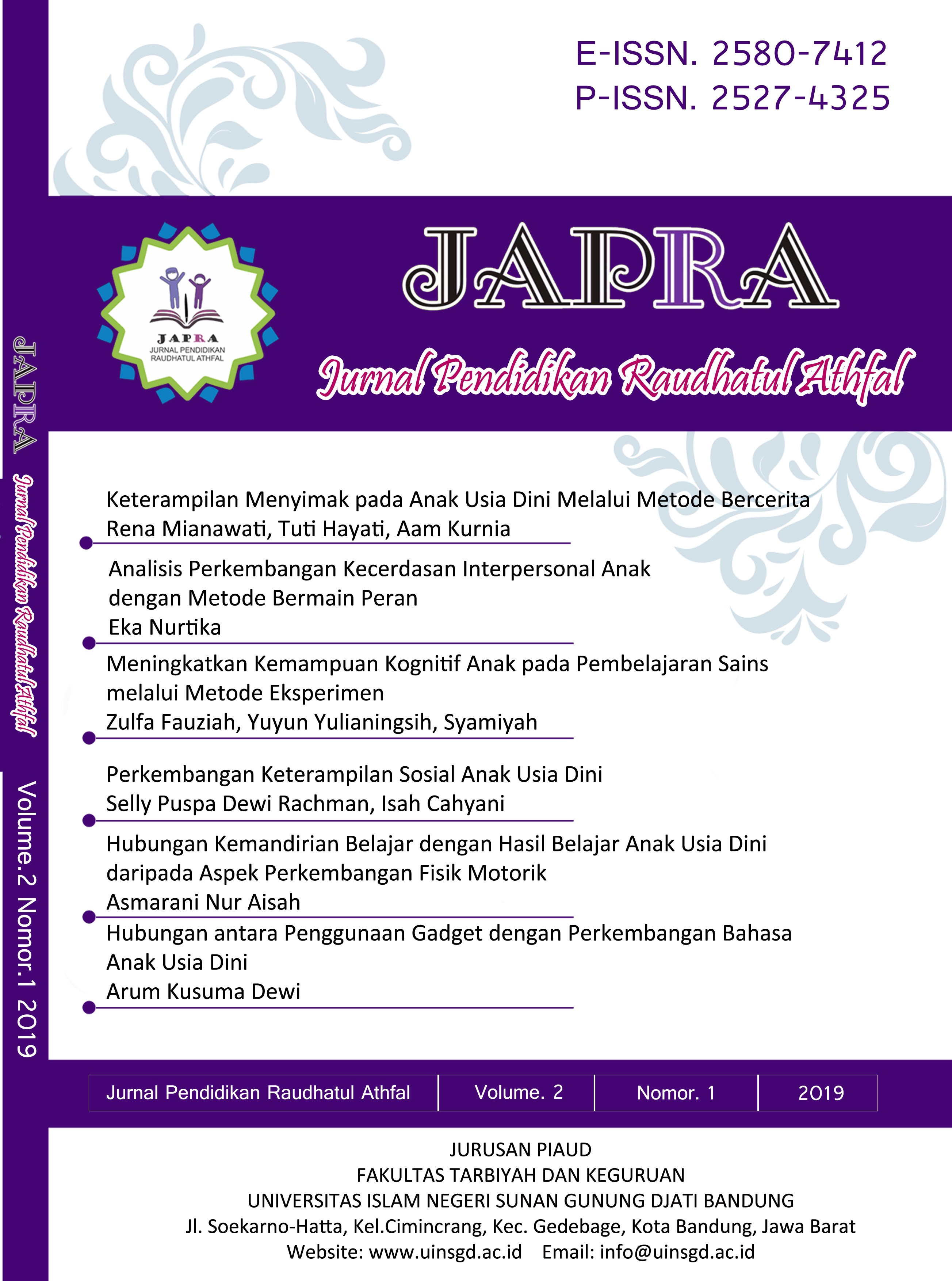Pengaruh Permainan Acak Geometri Terhadap Perkembangan Kecerdasan Logika-Matematika Anak
DOI:
https://doi.org/10.15575/japra.v3i1.8107Keywords:
Perkembangan Kecerdasan Logika-Matematika, Permainan Acak Geometri, Development of Logic-Mathematical Intelligence, Random Geometry GamesAbstract
Based on the results of observations in the field on the development of mathematical logical intelligence in students has not developed optimally so it is necessary to apply the geometry random game media. This study aims to determine the effect of random geometry on the development of mathematical-logic intelligence in children at Nasyithatun Nisa Kindergarten, Teluk Kiambang, Tempuling District, Indragiri Hilir Regency. The sample used in this study was 13 students consisting of one class. The data collection techniques used are test, observation and documentation. The data analysis technique used the Prerequisite test and Hypothesis test using the SPSS 17. The research hypothesis was that the activity of using geometric random games had an influence on the development of mathematical-logic intelligence in group B children at Nasyithatun Nisa Kindergarten. This can be seen from the results of data analysis on the comparison of the pretest and posttest classes obtained by tcount = 50,229 and Sig. (2-tailed) = 0,000. because of Sig. (2-tailed) = 0,000 <0,05, it can be concluded that there is a significant effect after using geometric random play in learning. So that means Ho is rejected and Ha is accepted, which means that in this study there is the influence of random geometry games before and after treatment. The effect of random geometry on the development of logic-mathematical intelligence in children at Nasyithatun Nisa Kindergarten was 82,005%.References
Armstrong, Thomas. 2009. Multiple Intelligences in the Class Third Edition.Terjemah oleh Dyah Widya Prabaningrum. Jakarta: Indeks.
Hartati, Sofia. 2005. Perkembangan Anak Usia Dini. Jakarta: Depdiknas.
HP., Novianto. Kamus Lengkap bahasa Indonesia. Solo: Bringin 55.
Jakni. 2016. Metodologi Penelitian Eksperimen Bidang Pendidikan. Bandung: Alfabeta.
Jamaris, Martini. 2017.Pengukuran Kecerdasan Jamak. Bogor: Ghalia Indonesia.
Kadir. 2016. Statistika Terapan Edisi Kedua. Jakarta: RajaGrafindo Persada.
Khasanah, Ismatul dan Regelna Juniarti. 2015. Upaya Meningkatkan Kemampuan Mengenal Konsep Bilangan Melalui Media APE “Kubus Angka†Pada Kelompok A TK Tunas Rimba 1 Semarang Tahun 2013/2014. Educhild.Vol.4 No. 1. Di ambil dari: https://ejournal.unri.ac.id/index.php/JPSBE/article/view/2797 (25 Januari 2018).
Kurnia, Rita. 2009. Metodologi Pengembangan Matematika Anak Usia Dini. Pekanbaru: Cendikia Insani.
Kurnia, Rita. 2011. Bermain dan Permainan Anak Usia Dini. Pekanbaru: Cendikia Insani.
Mulyasa, H.E. 2016. Manajemen PAUD. Bandung: Remaja Rosdakarya.
Nurlita. 2016. Meningkatkan Kemampuan Mengenal Bentuk Geometri Melalui Metode Proyek pada Anak Usia 5-6 Tahun di TK Mutiara Bunda Kecamatan Bangkinang Kota. Tugas Akhir. Fakultas Keguruan dan Ilmu Pendidikan Universitas Riau. Pekanbaru.
Pratiwi, Ellin Kartika. 2017. Pengaruh Permainan Kereta Api Geometri Terhadap Kemampuan Geometri Anak Usia 4-5 Tahun di TK Pertiwi Selat Baru Kecamatan Bantan Kabupaten Bengkalis. Tugas Akhir. Fakultas Keguruan dan Ilmu Pendidikan Universitas Riau. Pekanbaru.
Riduwan. 2010. Skala Pengukuran Variabel-variabel Penelitian. Bandung: Alfabeta.
Sari, Desi Kumala. 2017. Penerapan Permainan Kartu Angka dalam Mengembangkan Logika Matematika Anak Usia 5-6 Tahun di TK Widya Bhakti Tanjung Senang Bandar Lampung. Tugas Akhir. Fakultas Tarbiyah dan Keguruan Universitas Islam Negeri Raden Intan Lampung. Lampung. http://repository.radenintan.ac.id/3252/1/Skripsi_Full.pdf (25 Januari 2018)
Seefeldt, Carol dan Barbara A. Wasik. 2006. Early Education: Three, Four, and Five Year Olds Go to School. Terjemah oleh Pius Nasar. Jakarta: Indeks.
Sugiono. 2011. Metodologi Penelitian Pendidikan. Bandung: Alfabeta.
Sujiono, Yuliani Nurani dan Bambang Sujiono. 2010. Bermain Kreatif Berbasis Kecerdasan Jamak. Jakarta: Indeks.
Suyadi. 2014. Teori Pembelajaran Anak Usia Dini dalam Kajian Neurosains. Bandung: Remaja Rosdakarya.
Triharso, Agung. 2013. Permainan Kreatif & Edukatif untuk Anak Usia Dini. Yogyakarta: ANDI.
Yaumi, Muhammad. 2012. Pembelajaran Berbasis Multiple Intelligences. Jakarta: Dian Rakyat.
Downloads
Published
Issue
Section
License
Authors who publish with this journal agree to the following terms:
- Authors retain copyright and grant the journal right of first publication with the work simultaneously licensed under a Attribution-ShareAlike 4.0 International (CC BY-SA 4.0) License that allows others to share the work with an acknowledgment of the work's authorship and initial publication in this journal.
- Authors are able to enter into separate, additional contractual arrangements for the non-exclusive distribution of the journal's published version of the work (e.g., post it to an institutional repository or publish it in a book), with an acknowledgment of its initial publication in this journal.
- Authors are permitted and encouraged to post their work online (e.g., in institutional repositories or on their website) prior to and during the submission process, as it can lead to productive exchanges, as well as earlier and greater citation of published work (See The Effect of Open Access).
